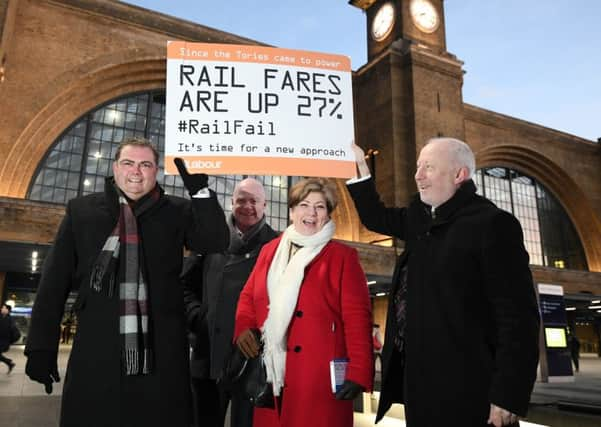Glasgow rail protest planned as fares rise by up to 7 per cent
This article contains affiliate links. We may earn a small commission on items purchased through this article, but that does not affect our editorial judgement.


ScotRail passengers have seen among the lowest annual increase among train operators, with rises in peak fares of 1.9 per cent and off-peak tickets by 0.9 per cent from Monday.
In addition, monthly and annual season ticket holders have been given one free week’s travel because of disruption last autumn.
Advertisement
Hide AdAdvertisement
Hide AdHowever, cross-Border operators have brought in larger increases, with the highest at Virgin Trains East Coast (Vtec), of 4.9 per cent on average.
Some of its fares, including an off-peak single between Edinburgh and London, has gone up by 7 per cent.
Tickets on Virgin Trains’ west coast services, such as Glasgow-London, have increased by an average of 2.4 per cent.
Vtec said it had added more cheaper advance tickets, “making it easier to get a bargain when booking ahead”.
It said some tickets were cheaper than when it took over the franchise nearly two years ago.
CrossCountry was unable to provide an average fare increase figure, but rises include 3.9 per cent for an anytime (peak) return between Bristol and Edinburgh.
The average increase across Britain is 2.3 per cent.
The latest increases reignited the debate over Britain’s fiendishly-complicated rail fares system with claims that peak tickets are far more expensive than some other European countries.
However, rail expert Mark Smith, “the man in seat 61”, said Britain had cheaper fares too.
Advertisement
Hide AdAdvertisement
Hide AdHe said: “The big picture is that Britain has the most commercially-aggressive fares in Europe, with the highest fares designed to get maximum revenue from business travel, and some of the lowest fares designed to get more revenue by filling more seats.”
TSSA members and other protesters will gather at Glasgow Central at 5pm tomorrow ahead of a public meeting with other unions and the STUC in the city centre on Thursday evening.
The forum will be held at the Renfield Centre in Bath Street at 6:30pm.
The demonstration follows protests today at stations in England and Wales to coincide with the earlier return to work after the festive break.
TSSA general secretary Manuel Cortes said: “As the British Government moves rudderless towards triggering Article 50, the Tories must be made to end the scandalous situation which means Britain’s rail network is now nothing more than a gravy-train for Germany, France and Holland.
“Profits made from the imposed fare rises this week will continue to be used to subsidise the fares of passengers in other EU countries rather than invested in making things better for UK rail passengers,
“Abellio [which runs ScotRail], Arriva [CrossCountry] and Keolis are familiar names within our failing privatised railway.
“However, these companies are front organisations for the Dutch, the German and the French state-owned rail companies who are driving passenger costs up in Britain to make handsome profits which can be used to subsidise train fares in their respective countries.”
Advertisement
Hide AdAdvertisement
Hide AdThe TSSA backs Labour’s campaign for re-nationalisation of the railways, while the SNP Scottish Government has pledged a public sector bid for the next ScotRail franchise from 2025.
DOWNLOAD THE SCOTSMAN APP ON ITUNES OR GOOGLE PLAY